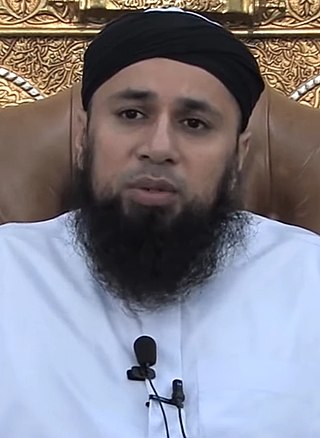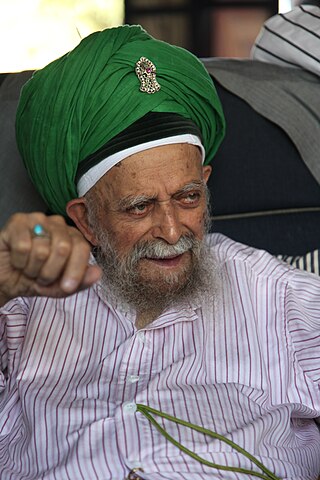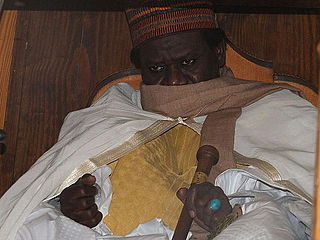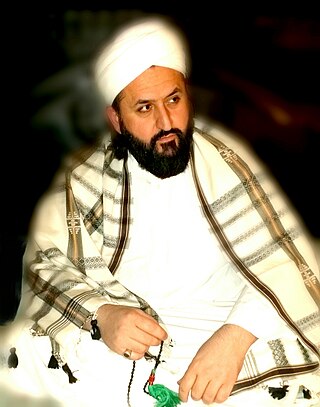Related Research Articles

The Deobandi movement or Deobandism is a revivalist movement within Sunni Islam that adheres to the Hanafi school of law. It was formed in the late 19th century around the Darul Uloom Madrassa in Deoband, India, from which the name derives, by Muhammad Qasim Nanautavi, Rashid Ahmad Gangohi, Ashraf Ali Thanwi and Khalil Ahmad Saharanpuri after the Indian Rebellion of 1857–58. They opposed the influence of non-Muslim cultures on the Muslims living in South Asia. The movement pioneered education in religious sciences through the Dars-i-Nizami associated with the Lucknow-based ulama of Firangi Mahal with the goal of preserving traditional Islamic teachings from the influx of modernist and secular ideas during British colonial rule. The Deobandi movement's Indian clerical wing, Jamiat Ulema-e-Hind, was founded in 1919 and played a major role in the Indian independence movement through its participation in the Pan-Islamist Khilafat movement and propagation of the doctrine of composite nationalism.

Abdulrab Rasul Sayyaf is an exiled Afghan politician and former mujahideen commander. He took part in the war against the Marxist–Leninist People's Democratic Party of Afghanistan (PDPA) government in the 1980s, leading the Afghan mujahideen faction Ittehad-al-Islami.
The Kharoti (Pashto:خروٹی) خروټی) are a Pashtun tribe of Ghilji origin, originating in the central part of Paktika Province, Afghanistan, but can be also found in other parts of the country. The Kharoti settled in Kharotabad in Quetta, British India around 1945.

Sunni Islam (Hanafi/Deobandi) is the largest and the state religion of the Islamic Emirate of Afghanistan. Islam in Afghanistan began to be practiced after the Arab Islamic conquest of Afghanistan from the 7th to the 10th centuries, with the last holdouts to conversion submitting in the late 19th century. It was generally accepted by local communities as a replacement of Zoroastrianism and Buddhism, local tribes began converting to the new religion. Islam is the official state religion of Afghanistan, with approximately 99.7% of the Afghan population being Muslim. Roughly 85% practice Sunni Islam, while around 10% are Shias. Most Shias belong to the Twelver branch and only a smaller number follow Ismailism.

Muhammad Hisham Kabbani was a Lebanese-American Sunni Sufi Muslim scholar belonging to the Naqshbandi Sufi Order. Kabbani has counseled and advised Muslim leaders to build community resilience against violent extremism. In 2012, the Royal Islamic Strategic Studies Centre named him on The 500 Most Influential Muslims. His notable students include the world-famous boxer Muhammad Ali and former Indonesian President Susilo Bambang Yudhoyono.

Jamiat-e-Islami, sometimes shortened to Jamiat, is a predominantly Afghan Tajik political party and former paramilitary organisation in Afghanistan. It is the oldest and largest functioning political party in Afghanistan, and was originally formed as a student political society at Kabul University. It has a communitarian ideology based on Islamic law. During the Soviet–Afghan War and the subsequent First Afghan Civil War against the communist government, Jamiat-e Islami was one of the most powerful of the Afghan mujahideen groups. Burhanuddin Rabbani led the party from 1968 to 2011, and served as President of the Islamic State of Afghanistan from 1992 to 2001, in exile from 1996.

Sibghatullah Mojaddedi was an Afghan politician, who served as Acting President after the fall of Mohammad Najibullah's government in April 1992. He was the first leader to call for armed resistance against the Soviet-backed regime in 1979 and founded the Afghan National Liberation Front at the time; later becoming a respected figure among the various Afghan mujahideen. He served as the chairman of the 2003 loya jirga that approved Afghanistan's new constitution. In 2005, he was appointed chairman of the Meshrano Jirga, upper house of the National Assembly of Afghanistan, and was reappointed as a member in 2011. He also served on the Afghan High Peace Council. Mojaddedi is considered to have been a moderate leader.
Abu Muhammad al-Maqdisi —Abu Muhammad Assem al-Maqdisi, in full—is the assumed name of Assem ibn Muhammad ibn Tahir al-Barqawi, an Islamist Jordanian-Palestinian writer and Salafi jihadi ideologue. Al-Maqdisi is known for popularizing a handful of significant themes within radical Islam, including the theological concept of Al-Wala' wal-Bara'. He is regarded as one of the earliest public Islamists to openly denounce the Saudi royal family as apostates from Islam. Al-Maqdisi believes that democracy functions as a religion in its own right and has accused Muslim advocates of democracy of apostasy. Additionally, he is recognized as the spiritual mentor of Jordanian jihadist Abu Musab al-Zarqawi, who served as the initial leader of al-Qaeda in Iraq. In 2004, a significant ideological and methodological divide emerged between al-Maqdisi and al-Zarqawi due to the latter's proclamation of takfir against all Iraqi Shīʿites. Al-Maqdisi took a more cautious approach: he preferred targeted killings of Shīʿites, aiming to prevent al-Zarqawi's ideology from becoming counterproductive.

Karim Khalili is an Afghan politician serving as leader of the Hezb-e Wahdat Islami Afghanistan party. Most recently he was Chief of the Afghan High Peace Council from 2017 until its dissolvement in 2019. He was selected as a candidate for Second Vice President of Afghanistan in 2002 by Hamid Karzai; they were elected in 2004 and left office in 2014. Since 1989, he has also been one of the main leaders of the Wahdat political party of Hazara.
Hajji Din Mohammad also known as Azizullah Din Mohammad is a politician in Afghanistan who served as the Governor of Nangarhar Province and later Governor of Kabul Province. He is currently the Chairman of Peace and Development Islamic Party. He has been involved in the peace and reconciliation process between the Afghan Government and the Taliban and is currently the deputy of High Council for National Reconciliation. Haji Din Mohammad comes from a distinguished Pashtun "Arsala" family. The Arsala family is part of the Jabar Khel. He is the elder brother of late Hajji Abdul Qadir and Abdul Haq. His great-grandfather, Wazir Arsala Khan, served as Foreign Minister of Afghanistan in 1869. One of Arsala Khan's descendants, Taj Mohammad Khan, was a general at the Battle of Maiwand. Another descendant, Abdul Jabbar Khan, was Afghanistan’s first Ambassador to Russia.
The following lists events that happened during 1994 in Afghanistan.
The following lists events that happened during 1995 in Afghanistan.

Riyadh ul Haq is a British Islamic scholar. He has been lecturing and teaching as the lead scholar at Al Kawthar Academy, Leicester since 2004.

Amir Kulāl (1278–1370), Persian: امیر کلال, Arabic: امیر کلال, birth name Shams ud-Dīn, was a Persian Sufi Islamic scholar, widely considered to be one of the most influential in history. He was a member of the mystical Khajagan order. His father was the Sufi scholar Saif ud-Dīn Hamza, a sayyid descendant of Muhammad. Saif ud-Dīn Hamza was amir (chieftain) of the Persian Kulal-Tribe, his full title being Amir-i-Kulal. After his father's death, Shams ud-Dīn became the amir and head of the tribe. By this time his reputation as a scholar and religious figure had spread through Chagatai Khanate and the title Amir-i-Kulal, had become his common name. Because he made earthenware, he was popularly referred to as “Kulāl”, which means "potter" in Persian.

Shaykh Muhammad Nazim Adil Al-Qubrusi Al-Haqqani, commonly known as Shaykh Nazim, was a Turkish Cypriot Sunni Muslim imam and one of the most influential members of the Haqqani stream of the Naqshbandi order (tariqa) of Sunni Islam.
Arsalan Rahmani Daulat was selected to serve in the Meshrano Jirga, the upper house of Afghanistan's national assembly, in 2005 and 2010. He was appointed a Deputy Minister for Higher Education under the Taliban, in 1998. The United Nations Security Council issued Security Council Resolution 1267 in 1999, which listed senior Taliban members. The United Nations requested member states to freeze the financial assets of those individuals. He was one of the individuals who were sanctioned. He was also one of the four former Taliban leaders that accepted the reconciliation offer from the Afghan government. He was also named deputy leader of Khuddamul Furqan for political affairs.

Sheikh Ahmad Tijani Ali Cisse is the spiritual leader of the Tijaniyya Sufi order. The Tijaniyya is the largest Sufi order in Western Africa and its leader is responsible for nearly 300 million Sufi adherents.

Abobaker Mojadidi is a spiritual Muslim leader and socio-political activist from Afghanistan. He is a prominent figure and head of the Naqshbandi-Mojaddidi Tariqah. He was born to the house of Afghanistan's most influential spiritual and religious family in Kabul at the home and monastery of his respected grandfather at the Naqshbandi Khanaqah in Qala-e-Jawad. Mojadidi's father was assassinated when Mojadidi was 9 months old. His entire family was imprisoned – his mother, father, siblings, and grandparents – by Soviet and Pro-Soviet soldiers of the PDPA regime due to the family's strong influence within the masses in Afghanistan. He was left behind with a peasant woman from Wardak named "Shireen" who acted as his nanny. Shireen hid him in a tandoor in order to hide him from Pro-Soviet government forces. When the soldiers came in the room, they saw only Shireen and departed, thus allowing him to escape. While the Mojadidi women and children were freed after a year, the whereabouts of his father Shaykh M. Ismaiel Mojadidi Dean of Nurul Madariss Farouqi in Ghazni and head of Khuddamul Furqan, his grandfather Shaykh Ziaul Mashah'ikh Mohammad Ibrahim Mojaddidi head of the Naqshbandi-Mojadidi Tariqah, uncles, and 140 other male relatives are unknown till this day. They are presumed to have been killed by the Soviet-backed forces.
Gibril Fouad Haddad is a Lebanese-born Islamic scholar, hadith expert (muhaddith), author, and translator of classical Islamic texts. He was featured in the inaugural list of The 500 Most Influential Muslims and has been called "one of the clearest voices of traditional Islam in the Western world", a "prominent orthodox Sunni" and a "staunch defender of the traditional Islamic schools of law." He holds ijazas from over 150 scholars across the Muslim world. He was a visiting fellow (2013-2015) then senior assistant professor (2015-2018) at the Sultan Omar Ali Saifuddin Center for Islamic Studies, Universiti Brunei Darussalam. He is also a staunch critic of Wahhabism and Salafism.

Sufism is considered as an essential aspect of Islam in Afghanistan. Most people are not followers of Sufism but Sufis have a considerable influence on both urban and rural society. Sufism has been part of the country for as long as 1300 years, so Afghanistan is recognised as the "Home of Sufi Saints". Sufism was suppressed by the Taliban when they governed from 1996 to 2001, after which it was regaining its importance.
Sufism has shaped Afghan society and politics for much of the country's history. Today, very few are aware of this legacy. Might the Sufis now provide an important contribution to the stability of the country?
References
- ↑ "The Ex-Taleban on the High Peace Council: A Renewed Role for the Khuddam ul-Furqan?". Archived from the original on 2012-09-04. Retrieved 2012-05-22.
- 1 2 Olesen, Asta. Islam and Politics in Afghanistan.
- ↑ Olesen, Asta. Islam and Politics in Afghanistan. Nordic Institute of Asian Studies (NIAS). p. 146.
- ↑ "Afghan peace negotiator Arsala Rahmani shot dead". BBC News. 13 May 2012.
- ↑ "Ahmad Amin Mojadidi, leader of Afghanis". Getty Images AFP News. 6 June 2004.
- ↑ "Another Hit at the High Peace Council: Arsala Rahmani Killed (Amended)". 13 May 2012. Archived from the original on 8 April 2013. Retrieved 29 April 2013.